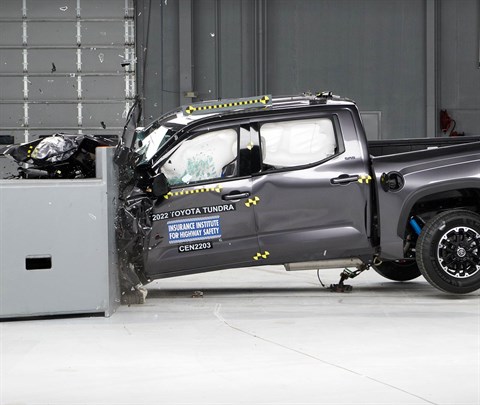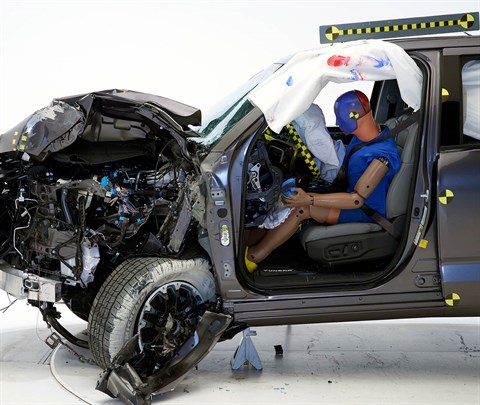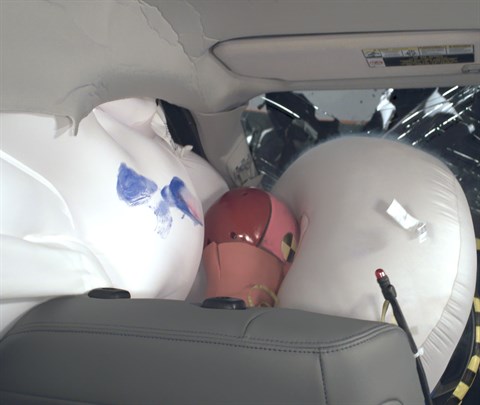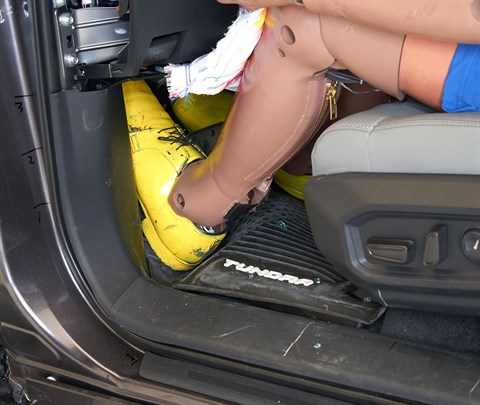The crew toyota tundra
Этот трак компания Тойота показала на шоу Ассоциации Производителей Специализированного Оборудования (SEMA) в 2009 г. И хотя эта специфическая версия трака не пошла в производство, нет непреодолимых препятствий для создания подобного.
Концепт Toyota Tundra TR 2009 г. был в какой то степени создан как дань моде на драг рейсинг. Компания Тойота объяснила его создание: «давно в 60-х начале 70-х годов автопроизводители откликнулись на растущую потребность в напичканных авто, создав сегмент сейчас известный как «заряженный авто». Идеальной концепцией было объединение самой легкой платформы с самым мощным двигателем, давая, таким образом, покупателю наилучшее возможное соотношение веса к мощности. В то время как многие пакеты громко рекламировали внешность авто (Super Bee, Boss 302, GTO, Challenger), некоторые наиболее сильные комбинации практически не имели опций, не отличались по внешнему виду от базовой модели и были внешне обычными «сонными» авто».
Компания Тойота начала с самой легкой версии Toyota Tundra – с приводом на 2 колеса Tundra Grade с укороченной базой, оснащенной 5.7-литровым двигателем iForce V-8 с 381 л.с. Затем компания Тойота приступила к работе, добавив большое количество деталей от компании Тойота Рейсинг Девелопментс (TRD). Компания TRD предлагает покупателям пакеты Thunder Paks и компания Тойота установила два таких пакета на трак. Пакет Thunder Pak № 1 включает спортивную подвеску от TRD, опустившую трак, и выхлопную систему с черным керамическим покрытием. Пакет Thunder Pak №2 – вот здесь появляется настоящая мощность – он идет с турбонаддувом от TRD и измерителем наддува. Получается мощность в 500 л.с. и крутящий момент 550 фунт/фут. Существует дополнительное послепродажное оборудование, которое добавило еще мощности траку SEMA – это Система впрыска закиси азота Нитрос. Она дает прибавку в 150 л.с от двух 10-ти фунтовых баллонов, получая общую мощность в 625 л.с. Matte Black Tundra получила окрашенный в черный цвет передний и задний бамперы и решетку радиатора, стандартные 18-ти дюймовые диски колес, также окрашенные в черный цвет. Интерьер тоже сделан в черном цвете. Внутри устанавливаются сиденья ковшеобразной формы.
Дополнительный набор аксессуаров для интерьера включает пакет TRD Sport Tuner с черным обрамлением приборов, обрамлением ручки переключения передач, вставки в двери, плюс измерительные приборы, включая 5-ти дюймовый тахометр на подставке. Мы проводили испытания такого трака. Это был обычный Tundra Grade V-8 с турбонаддувом, но без системы Нитрос. Мы смогли достичь отметки в 60 миль за 4.4 секунды. И мы могли только представить себе его скорость, если б он был с Нитрос. Хотите такой трак? Поторопитесь. Производство обычного трака с короткой базой с двигателем 5.7 литров прекратится в 2011г.
2023 Toyota Tundra
Some ratings use a scale of Poor to Good. Others range from Basic to Superior.
- Small overlap front: driver-side
- Small overlap front: passenger-side
- Moderate overlap front: original test
- Side: original test
- Side: updated test
- Roof strength
- Head restraints & seats
- Front crash prevention: vehicle-to-vehicle
- Front crash prevention: vehicle-to-pedestrian (day)
- Front crash prevention: vehicle-to-pedestrian (night)
- Headlights
- Seat belt reminders
Small overlap front: driver-side
Rating applies to 2022-23 models
Tested vehicle: 2022 Toyota Tundra SR5 CrewMax 4wd
The Toyota Tundra Crew Cab was redesigned for the 2022 model year.
Action shot taken during the driver-side small overlap frontal crash test.
The dummy’s position in relation to the door frame, steering wheel, and instrument panel after the crash test indicates that the driver’s survival space was maintained very well.
The frontal and side curtain airbags worked well together to keep the head from coming close to any stiff structure or outside objects that could cause injury.
The driver’s space was maintained well, and risk of injuries to the dummy’s legs and feet was low.
Measures of occupant compartment intrusion on driver side
| Test ID | CEN2203 |
|---|---|
| Lower occupant compartment | |
| Lower hinge pillar max (cm) | 5 |
| Footrest (cm) | 9 |
| Left toepan (cm) | 8 |
| Brake pedal (cm) | 1 |
| Parking brake (cm) | |
| Rocker panel lateral average (cm) | 1 |
| Upper occupant compartment | |
| Steering column | 0 |
| Upper hinge pillar max (cm) | 5 |
| Upper dash (cm) | 7 |
| Lower instrument panel (cm) | 7 |
Driver injury measures
| Test ID | CEN2203 |
|---|---|
| Head | |
| HIC-15 | 173 |
| Peak gs at hard contact | no contact |
| Neck | |
| Tension (kN) | 1.7 |
| Extension bending moment (Nm) | 17 |
| Maximum Nij | 0.32 |
| Chest maximum compression (mm) | 25 |
| Femur (kN) | |
| Left | 1.2 |
| Right | 1.2 |
| Knee displacement (mm) | |
| Left | 4 |
| Right | 4 |
| Knee-thigh-hip injury risk (%) | |
| Left | 0 |
| Right | 0 |
| Maximum tibia index | |
| Left | 0.75 |
| Right | 0.42 |
| Tibia axial force (kN) | |
| Left | 4.9 |
| Right | 2.4 |
| Foot acceleration (g) | |
| Left | 122 |
| Right | 115 |
Small overlap front: passenger-side
Rating applies to 2022-23 models
Tested vehicle: 2022 Toyota Tundra CrewMax 4wd
The Toyota Tundra Crew Cab was redesigned for the 2022 model year. Passenger-side small overlap frontal ratings are assigned by the Institute based on a test of a 2022 Tundra Crew Cab conducted by Toyota as part of frontal crash test verification.
Measures of occupant compartment intrusion on passenger side
| Test ID | VTP2206 |
|---|---|
| Lower occupant compartment | |
| Lower hinge pillar max (cm) | 6 |
| Footrest (cm) | 16 |
| Right toepan (cm) | 16 |
| Center toepan (cm) | 13 |
| Rocker panel lateral average (cm) | 0 |
| Upper occupant compartment | |
| Center dash (cm) | 4 |
| Upper hinge pillar max (cm) | 5 |
| Upper dash (cm) | 5 |
| Right lower dash (cm) | 5 |
Passenger injury measures
| Test ID | VTP2206 |
|---|---|
| Head | |
| HIC-15 | 287 |
| Peak gs at hard contact | no contact |
| Neck | |
| Tension (kN) | 1.6 |
| Extension bending moment (Nm) | 13 |
| Maximum Nij | 0.29 |
| Chest maximum compression (mm) | 18 |
| Femur (kN) | |
| Left | 1.9 |
| Right | 2.4 |
| Knee displacement (mm) | |
| Left | 5 |
| Right | 6 |
| Knee-thigh-hip injury risk (%) | |
| Left | 0 |
| Right | 0 |
| Maximum tibia index | |
| Left | 0.44 |
| Right | 0.55 |
| Tibia axial force (kN) | |
| Left | 2.0 |
| Right | 4.2 |
| Foot acceleration (g) | |
| Left | 88 |
| Right | 142 |
Driver injury measures
| Test ID | VTP2206 |
|---|---|
| Head | |
| HIC-15 | 170 |
| Peak gs at hard contact | no contact |
| Neck | |
| Tension (kN) | 1.3 |
| Extension bending moment (Nm) | 4 |
| Maximum Nij | 0.19 |
| Chest maximum compression (mm) | 31 |
| Femur (kN) | |
| Left | 0.7 |
| Right | 0.7 |
| Knee displacement (mm) | |
| Left | 1 |
| Right | 2 |
| Knee-thigh-hip injury risk (%) | |
| Left | 0 |
| Right | 0 |
| Maximum tibia index | |
| Left | 0.22 |
| Right | 0.23 |
| Tibia axial force (kN) | |
| Left | 0.7 |
| Right | 0.3 |
| Foot acceleration (g) | |
| Left | 36 |
| Right | 52 |
Moderate overlap front: original test
Rating applies to 2022-23 models
Tested vehicle: 2022 Toyota Tundra SR5 CrewMax 4wd
The Toyota Tundra Crew Cab was redesigned for the 2022 model year. Moderate overlap frontal ratings are assigned by the Institute based on a test of a 2022 Tundra Crew Cab conducted by Toyota as part of frontal crash test verification.
2023 Toyota Tundra
Some ratings use a scale of Poor to Good. Others range from Basic to Superior.
- Small overlap front: driver-side
- Small overlap front: passenger-side
- Moderate overlap front: original test
- Side: original test
- Side: updated test
- Roof strength
- Head restraints & seats
- Front crash prevention: vehicle-to-vehicle
- Front crash prevention: vehicle-to-pedestrian (day)
- Front crash prevention: vehicle-to-pedestrian (night)
- Headlights
- Seat belt reminders
Small overlap front: driver-side
Rating applies to 2022-23 models
Tested vehicle: 2022 Toyota Tundra SR5 CrewMax 4wd
The Toyota Tundra Crew Cab was redesigned for the 2022 model year.
Action shot taken during the driver-side small overlap frontal crash test.
The dummy’s position in relation to the door frame, steering wheel, and instrument panel after the crash test indicates that the driver’s survival space was maintained very well.
The frontal and side curtain airbags worked well together to keep the head from coming close to any stiff structure or outside objects that could cause injury.
The driver’s space was maintained well, and risk of injuries to the dummy’s legs and feet was low.
Measures of occupant compartment intrusion on driver side
| Test ID | CEN2203 |
|---|---|
| Lower occupant compartment | |
| Lower hinge pillar max (cm) | 5 |
| Footrest (cm) | 9 |
| Left toepan (cm) | 8 |
| Brake pedal (cm) | 1 |
| Parking brake (cm) | |
| Rocker panel lateral average (cm) | 1 |
| Upper occupant compartment | |
| Steering column | 0 |
| Upper hinge pillar max (cm) | 5 |
| Upper dash (cm) | 7 |
| Lower instrument panel (cm) | 7 |
Driver injury measures
| Test ID | CEN2203 |
|---|---|
| Head | |
| HIC-15 | 173 |
| Peak gs at hard contact | no contact |
| Neck | |
| Tension (kN) | 1.7 |
| Extension bending moment (Nm) | 17 |
| Maximum Nij | 0.32 |
| Chest maximum compression (mm) | 25 |
| Femur (kN) | |
| Left | 1.2 |
| Right | 1.2 |
| Knee displacement (mm) | |
| Left | 4 |
| Right | 4 |
| Knee-thigh-hip injury risk (%) | |
| Left | 0 |
| Right | 0 |
| Maximum tibia index | |
| Left | 0.75 |
| Right | 0.42 |
| Tibia axial force (kN) | |
| Left | 4.9 |
| Right | 2.4 |
| Foot acceleration (g) | |
| Left | 122 |
| Right | 115 |
Small overlap front: passenger-side
Rating applies to 2022-23 models
Tested vehicle: 2022 Toyota Tundra CrewMax 4wd
The Toyota Tundra Crew Cab was redesigned for the 2022 model year. Passenger-side small overlap frontal ratings are assigned by the Institute based on a test of a 2022 Tundra Crew Cab conducted by Toyota as part of frontal crash test verification.
Measures of occupant compartment intrusion on passenger side
| Test ID | VTP2206 |
|---|---|
| Lower occupant compartment | |
| Lower hinge pillar max (cm) | 6 |
| Footrest (cm) | 16 |
| Right toepan (cm) | 16 |
| Center toepan (cm) | 13 |
| Rocker panel lateral average (cm) | 0 |
| Upper occupant compartment | |
| Center dash (cm) | 4 |
| Upper hinge pillar max (cm) | 5 |
| Upper dash (cm) | 5 |
| Right lower dash (cm) | 5 |
Passenger injury measures
| Test ID | VTP2206 |
|---|---|
| Head | |
| HIC-15 | 287 |
| Peak gs at hard contact | no contact |
| Neck | |
| Tension (kN) | 1.6 |
| Extension bending moment (Nm) | 13 |
| Maximum Nij | 0.29 |
| Chest maximum compression (mm) | 18 |
| Femur (kN) | |
| Left | 1.9 |
| Right | 2.4 |
| Knee displacement (mm) | |
| Left | 5 |
| Right | 6 |
| Knee-thigh-hip injury risk (%) | |
| Left | 0 |
| Right | 0 |
| Maximum tibia index | |
| Left | 0.44 |
| Right | 0.55 |
| Tibia axial force (kN) | |
| Left | 2.0 |
| Right | 4.2 |
| Foot acceleration (g) | |
| Left | 88 |
| Right | 142 |
Driver injury measures
| Test ID | VTP2206 |
|---|---|
| Head | |
| HIC-15 | 170 |
| Peak gs at hard contact | no contact |
| Neck | |
| Tension (kN) | 1.3 |
| Extension bending moment (Nm) | 4 |
| Maximum Nij | 0.19 |
| Chest maximum compression (mm) | 31 |
| Femur (kN) | |
| Left | 0.7 |
| Right | 0.7 |
| Knee displacement (mm) | |
| Left | 1 |
| Right | 2 |
| Knee-thigh-hip injury risk (%) | |
| Left | 0 |
| Right | 0 |
| Maximum tibia index | |
| Left | 0.22 |
| Right | 0.23 |
| Tibia axial force (kN) | |
| Left | 0.7 |
| Right | 0.3 |
| Foot acceleration (g) | |
| Left | 36 |
| Right | 52 |
Moderate overlap front: original test
Rating applies to 2022-23 models
Tested vehicle: 2022 Toyota Tundra SR5 CrewMax 4wd
The Toyota Tundra Crew Cab was redesigned for the 2022 model year. Moderate overlap frontal ratings are assigned by the Institute based on a test of a 2022 Tundra Crew Cab conducted by Toyota as part of frontal crash test verification.







